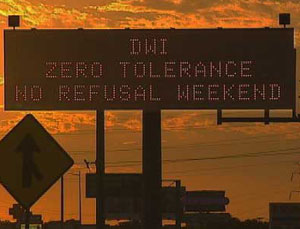An anti-DUI program in Schuylkill County is making itself visible in local bars and restaurants with the distribution of “Table Tents”. They are fliers that ask six questions on DUI laws and facts, and are intended to get people to compartmentalize the reality of a drinking and driving arrest. The questions include:
- Q: How much alcohol is equal to one “drink”?
- Q: A DUI arrest can result from impairment due to:
- Q: How many people were arrested for DUI in Pennsylvania last year?
- Q: What is the minimum amount a DUI in Pennsylvania would cost?
- Q: What is the range of fines for a DUI?
- Q: How many alcohol related crashes occurred in Pennsylvania last year?
The answers are:
- A: 12-ounce beer, 5-ounce wine, 1.5-ounce shot
- A: Just alcohol, illegal drugs, “designer drugs” (example: synthetic marijuana or bath salts) or prescription drugs
- A: 57,000
- A: $5,000
- A: $300 to $10,000
- A: 11,812 crashes
Many law enforcement agencies increase patrols around the holidays because there tend to be more alcohol and drug related crashes from Christmas to New Year’s. In 2011, Schuylkill County reported 72 motor vehicle accidents in the county, which resulted in two deaths.
Mahanoy City police Chief Mark J. Wiekrykas said, “We’ve seen an increase in the number of blood (test) results that are coming back (positive) for drugs.” He added that their first case of driving under the influence of bath salts occurred recently.



 If David Whitaker (D) wins the election for the Arkansas House of Representatives District 85, he would like to enact a
If David Whitaker (D) wins the election for the Arkansas House of Representatives District 85, he would like to enact a  10,228 people lost their lives in 2010 on account of drunk driving. State lawmakers try to tackle this issue with strict DUI laws and penalties. Sometimes states will experience spikes in DUI fatalities, accidents, and injuries, and lawmakers will respond with a crackdown on DUI offenders and pass stricter laws and add harsher punishments. The following is a snapshot of the states with the toughest DUI penalties in the nation.
10,228 people lost their lives in 2010 on account of drunk driving. State lawmakers try to tackle this issue with strict DUI laws and penalties. Sometimes states will experience spikes in DUI fatalities, accidents, and injuries, and lawmakers will respond with a crackdown on DUI offenders and pass stricter laws and add harsher punishments. The following is a snapshot of the states with the toughest DUI penalties in the nation.
 Bexar County has
Bexar County has